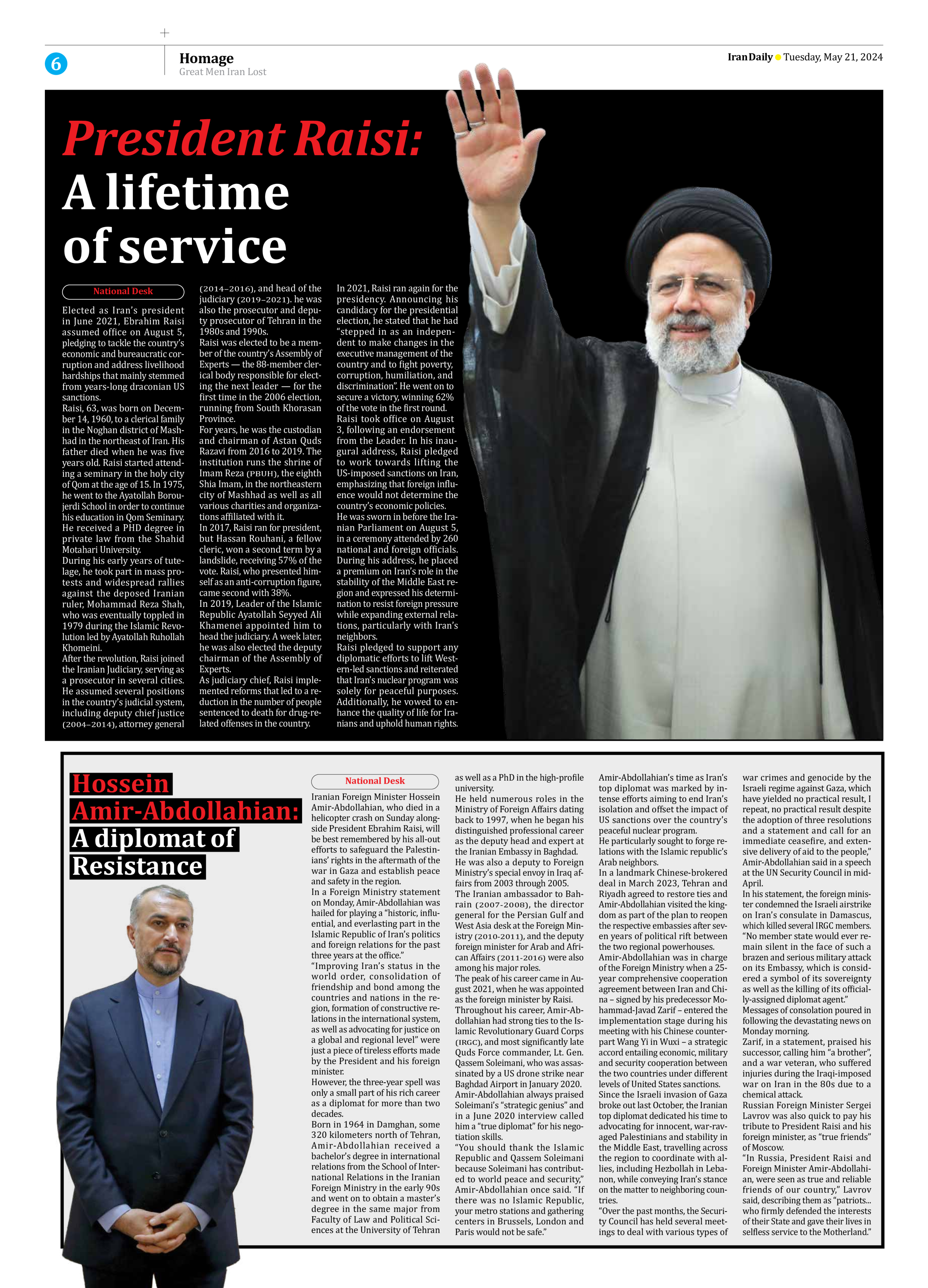
Copy in clipboard...
Hossein Amir-Abdollahian: A diplomat of Resistance
In a Foreign Ministry statement on Monday, Amir-Abdollahian was hailed for playing a “historic, influential, and everlasting part in the Islamic Republic of Iran’s politics and foreign relations for the past three years at the office.”
“Improving Iran’s status in the world order, consolidation of friendship and bond among the countries and nations in the region, formation of constructive relations in the international system, as well as advocating for justice on a global and regional level” were just a piece of tireless efforts made by the President and his foreign minister.
However, the three-year spell was only a small part of his rich career as a diplomat for more than two decades.
Born in 1964 in Damghan, some 320 kilometers north of Tehran, Amir-Abdollahian received a bachelor’s degree in international relations from the School of International Relations in the Iranian Foreign Ministry in the early 90s and went on to obtain a master’s degree in the same major from Faculty of Law and Political Sciences at the University of Tehran as well as a PhD in the high-profile university.
He held numerous roles in the Ministry of Foreign Affairs dating back to 1997, when he began his distinguished professional career as the deputy head and expert at the Iranian Embassy in Baghdad.
He was also a deputy to Foreign Ministry’s special envoy in Iraq affairs from 2003 through 2005.
The Iranian ambassador to Bahrain (2007-2008), the director general for the Persian Gulf and West Asia desk at the Foreign Ministry (2010-2011), and the deputy foreign minister for Arab and African Affairs (2011-2016) were also among his major roles.
The peak of his career came in August 2021, when he was appointed as the foreign minister by Raisi.
Throughout his career, Amir-Abdollahian had strong ties to the Islamic Revolutionary Guard Corps (IRGC), and most significantly late Quds Force commander, Lt. Gen. Qassem Soleimani, who was assassinated by a US drone strike near Baghdad Airport in January 2020.
Amir-Abdollahian always praised Soleimani’s “strategic genius” and in a June 2020 interview called him a “true diplomat” for his negotiation skills.
“You should thank the Islamic Republic and Qassem Soleimani because Soleimani has contributed to world peace and security,” Amir-Abdollahian once said. “If there was no Islamic Republic, your metro stations and gathering centers in Brussels, London and Paris would not be safe.”
Amir-Abdollahian’s time as Iran’s top diplomat was marked by intense efforts aiming to end Iran’s isolation and offset the impact of US sanctions over the country’s peaceful nuclear program.
He particularly sought to forge relations with the Islamic republic’s Arab neighbors.
In a landmark Chinese-brokered deal in March 2023, Tehran and Riyadh agreed to restore ties and Amir-Abdollahian visited the kingdom as part of the plan to reopen the respective embassies after seven years of political rift between the two regional powerhouses.
Amir-Abdollahian was in charge of the Foreign Ministry when a 25-year comprehensive cooperation agreement between Iran and China – signed by his predecessor Mohammad-Javad Zarif – entered the implementation stage during his meeting with his Chinese counterpart Wang Yi in Wuxi – a strategic accord entailing economic, military and security cooperation between the two countries under different levels of United States sanctions.
Since the Israeli invasion of Gaza broke out last October, the Iranian top diplomat dedicated his time to advocating for innocent, war-ravaged Palestinians and stability in the Middle East, travelling across the region to coordinate with allies, including Hezbollah in Lebanon, while conveying Iran’s stance on the matter to neighboring countries.
“Over the past months, the Security Council has held several meetings to deal with various types of war crimes and genocide by the Israeli regime against Gaza, which have yielded no practical result, I repeat, no practical result despite the adoption of three resolutions and a statement and call for an immediate ceasefire, and extensive delivery of aid to the people,” Amir-Abdollahian said in a speech at the UN Security Council in mid-April.
In his statement, the foreign minister condemned the Israeli airstrike on Iran’s consulate in Damascus, which killed several IRGC members.
“No member state would ever remain silent in the face of such a brazen and serious military attack on its Embassy, which is considered a symbol of its sovereignty as well as the killing of its officially-assigned diplomat agent.”
Messages of consolation poured in following the devastating news on Monday morning.
Zarif, in a statement, praised his successor, calling him “a brother”, and a war veteran, who suffered injuries during the Iraqi-imposed war on Iran in the 80s due to a chemical attack.
Russian Foreign Minister Sergei Lavrov was also quick to pay his tribute to President Raisi and his foreign minister, as “true friends” of Moscow.
“In Russia, President Raisi and Foreign Minister Amir-Abdollahian, were seen as true and reliable friends of our country,” Lavrov said, describing them as “patriots... who firmly defended the interests of their State and gave their lives in selfless service to the Motherland.”







